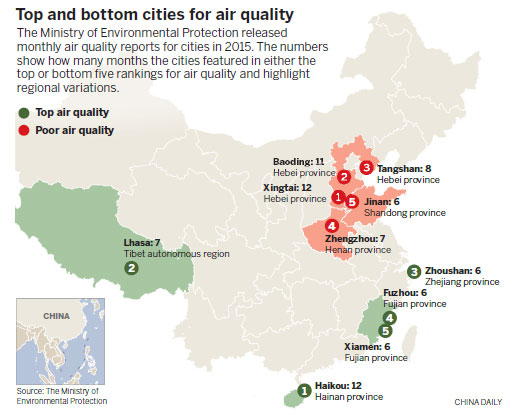Smog incentives hard to introduce
Obstacles include defining targeted groups and sources of funding
A survey that found majority support for issuing incentives and subsidies for people working outdoors on smoggy days reflects growing approval for improving worker conditions but it is not an easy goal to reach, experts said.
The survey was conducted by the labor union in Zhengzhou, capital of Henan province in December, when the vast northern region had been blanketed by heavy smog. The union is part of the All-China Federation of Trade Unions, the country's top labor organization.
The survey showed 96 percent of around 400 respondents agreed with issuing new smog incentives and subsidies and 90 percent voted to cover outdoor workers first, the group most exposed to polluted air.
More than half of the respondents (59 percent) preferred a combination of protective masks and cash, the survey found.
"It's urgently needed, no matter what the amount is or what protective items we receive," said Zhang Xiaojie, a traffic police officer working in Shijiazhuang, capital of Hebei province. The province had the majority of cities in the bottom 10 regarding air pollution in China in 2015.
December in Shijiazhuang saw two weeks when it failed to reach national standards on air quality.
"It's hard to breathe the choking air when standing in the police stand to direct traffic," the 28-year-old said. Police are positioned there for two hours every working day.
Smog frequently blanketed some cities in 2015, especially in winter, bringing about growing health concerns.
"It's time for governments to start researching smog incentives or subsidies because of growing public concern, especially after the survey showed majority support," said Li Binsheng, former head of the top labor federation's policy division and a member of the national political advisory body - the Chinese People's Political Consultative Conference.
Li Guowu, a member of the Hunan provincial advisory body, agreed on issuing the new incentives and subsidies, saying there should be laws to back its implementation.
However, all agreed it's not easy to turn discussion into action.
In spite of the wide support in the survey, it has not pushed the government to introduce formal regulations yet, said an official from the city's civil affairs department, who requested anonymity, in an interview with Workers' Daily.
There is a long road before new subsidies are introduced, including handing in proposals to the government, then related departments will conduct research to draft the detailed policies, the official said.
Then the draft policy goes to the city's legislative body for review, and then it is decided whether to make it law or not.
In addition to the process, it's hard to define the targeted groups and other details, said Li, a former policy division leader.
"It's not sufficient to cover the outdoor workers, since workers inside some small plants are also exposed to the smog."
Besides, it's necessary to make clear what kind of subsidies or incentives are needed, the protective masks or cash, Li said, adding that it's more important to clarify the sources of the subsidies, from governments or companies or both.
Some companies said it would be a financial burden for them if they shouldered the subsidies alone.
A manager of a private property management company in Pingdingshan city, Henan province, complained it's not practical for workers outdoors to have breaks under severe smog, the Workers' Daily reported.
If the policy requires shortening working time or giving breaks, there would be fewer people to clean the roads, said the manager, who only revealed her surname, Zhang.
"The company would follow the regulation to give smog subsidies, but it needs the government to make clear the details," she said.

























